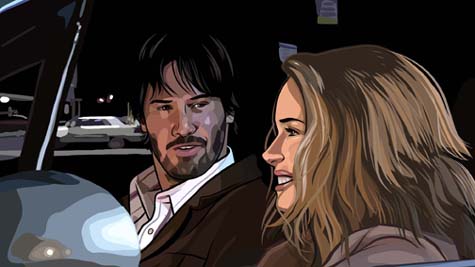|
Reviews of Recent Independent, Foreign, & Documentary Films in Theaters and DVD/Home Video
Directed & Written by: Richard Linklater, based on the novel by Philip K. Dick. Produced by: Tommy Pallotta, Jonah Smith, Erwin Stoff, Anne Walker-McBay & Palmer West. Director of Photography: Shane F. Kelly. Edited by: Sandra Adair. Music by: Graham Reynolds. Released by: Warner Independent. Country of Origin: USA. 100 min. Rated: R. With: Keanu Reeves, Robert Downey Jr., & Woody Harrelson, Winona Ryder, Rory Cochrane & Mitch Baker.
It feels good to say that Winona Ryder is a film’s high point again, considering it’s been at least a decade since a person could say that and be taken seriously. But it’s bittersweet. For one thing, the film in question doesn’t have many other high points. For another, I suspect the following analogies are apropos: digital animation technology is to Winona Ryder’s acting ability as digital music technology is to Madonna’s voice.
In A Scanner Darkly, Ryder, Keanu Reeves, Woody Harrelson and Robert Downey Jr. star as clumsy addicts of a futuristic drug named Substance D. Bob Arctor (Reeves), an undercover cop, settles into a druggie nest and uncover D’s local suppliers, but becomes addicted to the dangerous drug in the process.
Director Terry Gilliam initially owned the rights before eventually passing on it, and most recently, Charlie Kaufman had
penned a screenplay. It’s fitting that the project fell into maverick director Richard Linklater’s hands, since his brand of playful rotoscoping (live-action footage traced over by animation, first seen in Waking Life) presents an invigorating new twist on three decades worth of directorial attempts to portray Dick’s mind-bending futuristic sci-fi.
There are not that many things to say about the plot. Oh sure, there are several twists and turns, but most would either give
away the few genuine surprises the story offers or are too predictable to mention. It’s not hard to see that Scanner is
primarily an anti-drug film rather than a plot-driven feat. (Arguably, the most moving sequence is the epilogue with Dick’s
own closing words about “friends and comrades” lost to drug use). Having played stoners and addicts for comedic effect
throughout their respective careers, Reeves and Downey add a jolt of
humor as they falter about Arctor's rundown drug den with
paranoid fantasies, misunderstandings only junkies could make, and placid
Kafkaesque reactions to their friends turning into giant roaches. But these
characters are not just silly movie stoners, they're 40-year-old junkies and Linklater never lets us
forget the sadness of their lifestyle. It's quite a different thing to see Bill & Ted's Excellent Adventure continued 20
years later.
The decision to cast Reeves (an actor who can barely emote) in the role of Arctor (a man so addicted to drugs he can barely emote)
could be considered a successful casting choice, but Reeves refuses to show any reaction that would indicate his addiction to
hallucinogenic drugs. Similarly, Ryder as an apathetic drug addict is on the same level as Sean Young’s unruffled shoulder-padded
robot in Blade Runner, also adapted from a Dick novel.
These two films do have a lot in common. Everything from the acting to the script in both films is kitschy, melodramatic and somewhat obvious. But it’s the imagining of Dick’s sci-fi that makes each film worth watching. No one remembers what Sean Young’s character actually did in Blade Runner, but they do remember the retro-future world in which she lived.
While the animation in Scanner is not as well-woven into the screenwriting as it was in Waking Life, it
has an eerie realism that fits with the characters’ impaired vision and tenuous grasp of reality. The animation’s ever-present
reminder that these characters are rarely sober enough to analyze their lives are made haunting in scenes like where Ryder’s character
questions Arctor if they are happy in their drug-addicted life together. In such occasional moments, the film’s animated form connects with its characters’ wavering sense of identity.
Zachary Jones
|

